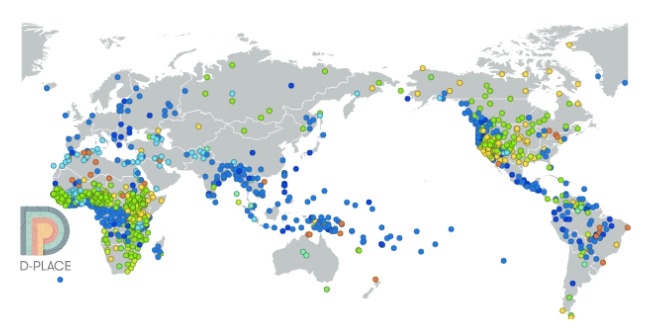
Massive open-access database on human cultures created
D-PLACE — the Database of Places, Language, Culture and Environment — is an expandable, open access database that brings together a dispersed body of information on the language, geography, culture and environment of more than 1,400 human societies. It comprises information mainly on pre-industrial societies that were described by ethnographers in the 19th and early 20th centuries.
The team’s paper on D-PLACE is published in the journal PLOS ONE.
“Human cultural diversity is expressed in numerous ways: from the foods we eat and the houses we build, to our religious practices and political organization, to who we marry and the types of games we teach our children,” said Kathryn Kirby, a postdoctoral fellow in the Departments of Ecology & Evolutionary Biology and Geography at the University of Toronto and lead author of the study. “Cultural practices vary across space and time, but the factors and processes that drive cultural change and shape patterns of diversity remain largely unknown.
“D-PLACE will enable a whole new generation of scholars to answer these long-standing questions about the forces that have shaped human cultural diversity.”
Co-author Fiona Jordan, senior lecturer in anthropology at the University of Bristol and one of the project leads said, “Comparative research is critical for understanding the processes behind cultural diversity. Over a century of anthropological research around the globe has given us a rich resource for understanding the diversity of humanity — but bringing different resources and datasets together has been a huge challenge in the past.
“We’ve drawn on the emerging big data sets from ecology, and combined these with cultural and linguistic data so researchers can visualize diversity at a glance, and download data to analyze in their own projects.”
D-PLACE allows users to search by cultural practice (e.g., monogamy vs. polygamy), environmental variable (e.g. elevation, mean annual temperature), language family (e.g. Indo-European, Austronesian), or region (e.g. Siberia). The search results can be displayed on a map, a language tree or in a table, and can also be downloaded for further analysis.
It aims to enable researchers to investigate the extent to which patterns in cultural diversity are shaped by different forces, including shared history, demographics, migration/diffusion, cultural innovations, and environmental and ecological conditions.
D-PLACE was developed by an international team of scientists interested in cross-cultural research. It includes researchers from Max Planck Institute for the Science of Human history in Jena Germany, University of Auckland, Colorado State University, University of Toronto, University of Bristol, Yale, Human Relations Area Files, Washington University in Saint Louis, University of Michigan, American Museum of Natural History, and City University of New York.
The diverse team included: linguists; anthropologists; biogeographers; data scientists; ethnobiologists; and evolutionary ecologists, who employ a variety of research methods including field-based primary data collection; compilation of cross-cultural data sources; and analyses of existing cross-cultural datasets.
“The team’s diversity is reflected in D-PLACE, which is designed to appeal to a broad user base,” said Kirby. “Envisioned users range from members of the public world-wide interested in comparing their cultural practices with those of other groups, to cross-cultural researchers interested in pushing the boundaries of existing research into the drivers of cultural change.” Source UToronto




